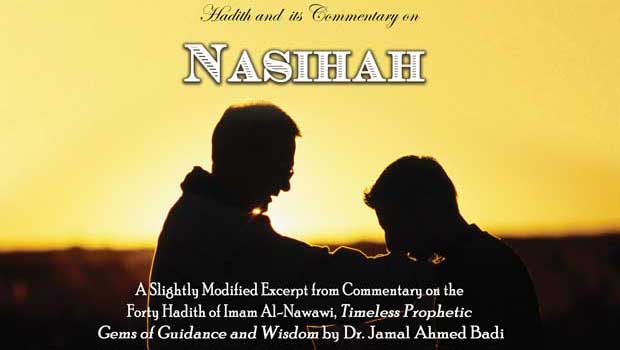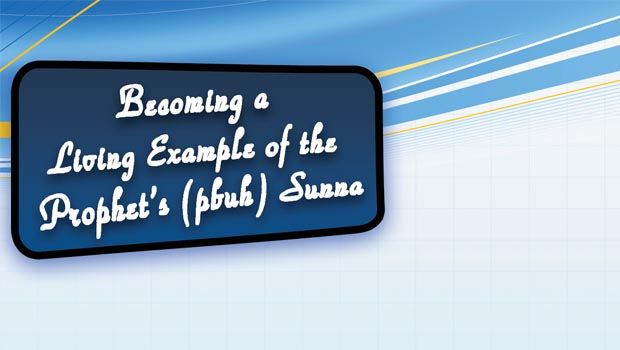An Excerpt from Commentary on the Forty Hadith of Imam Al-Nawawi. Timeless Prophetic Gems of Guidance and Wisdom
—-
On the authority of Tamīm Al-Dārī (RA) that the Prophet (pbuh) said:”Religion is nasihah.” We said: “To whom?” The Prophet (pbuh) said: “To Allah and His Book, and His Messenger, and to the leaders of the Muslims and their common folk”(Related by Muslim).
Introduction
There is no exact English translation for the word “nasihah” as it covers a broad concept. Some use the term “sincerity”, but this is only part of the meaning. According to Ibn Salah (RA), nasihah is “truly seeking the best, in terms of intention and action, for the one whom he is making nasihah to.” This hadith is a profound statement. Al-Sheikh JamālZarabozo says that this brief statement of the Prophet (pbuh) describes the essence of Islām. This is because it encompasses Islām, īmān and ihsan altogether.
Lessons
A. Nasihah to Allah
Nasihah should first be towards Allah (SWT). This includes fulfilling the obligations with ihsan in the best possible manner. This should be the main purpose of this life for every Muslim. This includes striving to get as close as possible to Allah (SWT) by doing not only that which is obligatory but also that which is preferable. On the other hand, one should refrain from doing that which is forbidden and avoiding that which is disliked.
Nasihah to Allah (SWT) encompasses the following:
• Believing in Allah (SWT) and disassociating any partners with Him.
• Believing in His names and attributes.
• Obeying and fulfilling His commandments.
• Abstaining from that which He has forbidden.
• Remembering Him under all situation and circumstances.
• Loving that which He loves and hating that which He hates.
• Recognizing the blessings that He (SWT) has bestowed upon us and properly thanking Him for these blessings.
One who wishes to do nasihah towards Allah (SWT) needs to have the correct intention. This is the case even if the individual may not be able to perform an obligation (due to an illness or lack of means). By having the correct niyyah, his responsibility towards Allah (SWT) is fulfilled. Thus, ikhlas is another important aspect of this great concept. One should always be honest and practice ikhlas in whatever is done. In fact, ikhlas should be the first thing that a Muslim should aim for when doing nasihah to Allah (SWT).
The actions of the heart and limbs also fall under nasihah to Allah (SWT). Actions of the heart include hope in the mercy of Allah, to trust Him, to fear Him, and to seek refuge in Him. As for the actions of the limbs, they include salah, zakāh, fasting, speaking the truth, etc.
B. Nasihah to His Book
After having nasihah to Allah, we need to have nasihah to His Book, the Quran. This encompasses the following:
• Believing that the Quran is the Word of Allah (SWT), and that it is not similar to the word of any human.
• To read, recite and practice the Quran as per one’s ability.
• To study its admonitions, lessons, and parables.
• Calling others to have faith in the Quran.
• To defend and protect the Quran from any kind of distortion or misinterpretation.
• To defend the Quran against any false claims which are made against it.
• To respect and treat the Quran in a proper manner
o For example, we should not throw away a piece of paper which has an āyah printed on it out of respect. This includes that present on magazines, newspapers, etc. This āyahof Allah (SWT) may be stepped upon or get filth on it. If we were to see such a piece of paper on the ground, we should pick it up and safeguard it or destroy it by burning or shredding.
C. Nasihah to His Messenger (pbuh)
After the Quran, then we need to have nasihah to the Messenger of Allah. This includes the following:
• Believing in the message revealed to the Prophet (pbuh) and believing all that was revealed to him (pbuh) was divinely inspired.
• Accepting him (pbuh) as the true leader of the ummah with regard to matters of the religion, his words are an authority in itself while everyone else’s statements and opinions come only after his.
• Accepting his Sunnah as the scale by which we judge a particular matter or issue.
• Loving him (pbuh) more than the love that we have towards ourselves and our family. It is the second level of love after the love of Allah (SWT). Our love for him (pbuh) should lead us to fulfilling our obligations and obeying him.
• Saying “sallallahu alayhi wassallam” whenever his name is mentioned.
• Loving those who love him (pbuh) and hating those who hate him.
• Reviving his Sunnah by learning, understanding, teaching and spreading it.
D. Removing Bidah by Reviving the Sunnah
Today, there are so many bidah being practiced by Muslims. One major way in removing the bidah is by reviving the Sunnah. As was said by one of the early scholars: “Bidah only arises when the Sunnah is not known or practiced.” One of the main problems today is that many Muslims are unaware of the Sunnah and the status of the Sunnah. To revive the Sunnah, one should not start by condemning the bidah but rather by introducing the Sunnah. One of the things that we should do is to make them aware of the Sunnah.In doing this, we should not be aggressive or confrontational as it may result in people who are being called to become offended and confused. This will result in the people rejecting the Sunnah.
As advised by Al-ImāmAhmad, we should do it in a nice, gentle and proper manner so that we do not end up arguing and fighting over it. Furthermore, we need to be excellent role models for those who love and follow the Sunnah. In this way, those who were unaware can understand, love, and appreciate the Sunnah when they themselves see the beauty of the Sunnah. They will then use the Sunnah as the yardstick in measuring the value of a certain action etc. Slowly, insha Allah, bidah shall be reduced and minimized.
While educating the people about the Sunnah, due care needs to be exercised so as to ensure that the people shall not be focusing on the minor issues. Sunnah is categorized into different levels and one should learn the basic elements before studying the details. We should also make the people understand, love and appreciate the Sunnah on a more basic and elementary level before going into the finer details. Insha Allah, this will lead to the revival of the Sunnah.
E. Loving the family and the Companions of Muhammad(pbuh)
There are some prominent deviant sects who propagate their false beliefs by creating doubts about the companions of the Prophet (pbuh) with the intention of making people hate them. Doing this actually entails rejecting the Sunnah. These sects believe the Sunnah is only derived through their aimmah and not others.
Allah (SWT) defends the sanctity of all of the companions of the Prophet (pbuh) in the Quran itself:
“And the first forerunners [in the faith] among the muhājirūn and the ansār and those who followed them with good conduct —Allah is pleased with them and they are pleased with Him, and He has prepared for them gardens beneath which rivers flow, wherein they will abide forever. That is the great attainment” (9:100).
Thus, it is necessary to love those who followed him (pbuh) during his time, defended him, and practicedIslām in the best manner. This is part of upholding the Sunnah. As for those who are of latter generations, we need to also love those who follow, defend, and strive to revive the Sunnah of the Prophet (pbuh).
F. Nasihah to the Muslim Leaders
The hadith continues, and then mentions nasihah to the Muslim leaders. The word ‘leader’ stands for both ulama and leaders in authority. Nasihah should be given to all leaders, regardless of their authority and rank. In Islām, no one is above the law and no one is free from the need of advice. Even Rasulullah(pbuh) sought the consultation of the companions when the need arose. For example, he(pbuh)consulted his companions while making plan for battle against the kuffār during the Battle of Al-Khandaq. On some other occasions, the companions offered nasihah without being asked such as in the Battle of Badr. Nasihah is for the benefit of anyone who is in authority. This means that the ruler, leader, or scholar should be among the first to receive sincere advice. It is also important to choosing the appropriate method, etiquette, and channel in advising them.
Nasihah to Muslim leaders include the following:
• Helping them in that which is good and beneficial.
• Obeying them in that which is right.
• Reminding them if they were to make mistakes or forget.
• Being patient with them if they do things which we dislike. We should try to give nasihah and at the same time tolerate them as opposing them will create instability in the Muslim community.
• Making jihād with them and not rebelling against their authority.
• Making duaʹ to Allah to give them guidance and piety.
The scholars state that nasihah towards the leaders should be done in accordance with certain guidelines:
1) One must have a good intention with sincerity.
2) It should be done in a mild and respectful manner. One should always avoid harshness and not seek to embarrass them. Our aim is to advise and correct them rather than showing off.
3) Not divulging or informing others about their wrongdoings as this may lead to more problems in society.
4) Giving the nasihah privately and not publicly.
If one is asked by the leader to commit a masiyah or sin, or something which contradicts with Shariah, one should never obey. Nevertheless, we should disobey in a non-aggressive manner. Our aim is to remind them that what they are seeking to do is wrong, so that they will change. This will be more effective in bringing about good than having a harsh response.
As for the scholars, our nasihah is to seek knowledge from them. Some guidelines about giving them nasihah are the following:
• We follow them if their opinion is based on sound proof and evidence.
• We do not seek to point out their mistakes. There are some people who wish to point out the mistakes of scholars. We should avoid such a temptation as scholars are pious people, and such an action may cause Allah (SWT) to be displeased with us. It can also create chaos in the community.
• We should not follow scholars blindly.
• We should not disrespect them.
G. Nasihah to the Muslim Community
The hadith concludes with the nasihah to the Muslim community. This nasihah includes observing the rights of other Muslims and fulfilling our obligations towards them. These obligations differ depending on the category they fall in (i.e., parents, children, relatives, neighbors, etc.) Some obligations to our fellow Muslims include greeting them, visiting them when they are sick, making duafor them, giving sincere advice if they request it, and praying salahtul-janāzah for the one who dies. Furthermore, more emphasis should be placed on sacrificing time, effort, and money for the benefit of the Muslim community.
H. The Concept of Al-Wala and al-Bara
One concept that is important in the nasihah to the Muslim community is the concept of al-walāʹ. The concept al-wala refers to love, care, and affinity for one another within the ummah for the sake of Allah (SWT), and encompasses the following:
1) to love every Muslim
2) to care for all Muslims
3) to help other Muslims
4) to defend and protect other Muslims
Al-wala also encompasses the actions that result from this. If one does not love, one will not care. If one does not care, one will not help. If one does not help, one will not protect. The reason why so many Muslims today do not care or help another is because their belief in al-wala is lacking. We should have love for other Muslims, especially those who are suffering, so that they can be cared for and helped. The scholars are of the opinion that the least that a Muslim can do for another is to make duʼāʹ for them.
The concept of al-bara is actually contrary to al-walāʹ and refers to enmity and disassociation with the people of disbelief and falsehood. This is usually practiced for the purpose of preventing Muslims from committing evil. However, al-bara should be avoided if (1) it is done for our own self-interest, and (2) it will not lead the other person to mend his ways. Instead of disassociating ourselves from such an individual, we should give good and sincere advice and educate him or her. We should show our love and concern and provide good nasihah in the proper way. It is only if all other attempts fail, that we can use the concept of disassociation. And even this should be done only if al-barais capable of leading the individual to change his ways.
I. Benefitting and Caring for the Muslim Community
The Prophet (pbuh) said:”The Muslim is one whom other Muslims are safe from his tongue and his hand” (Sahih Bukhari and Sahih Muslim).
The true Muslim is one who will not harm others verbally, physically, or by any other means. Mercy and respect are important elements of etiquette towards the community. Having mercy for the young and showing respect to the elders should be an end result from glorifying Allah (SWT). This is as per the following hadith:“He is not from us one who does not have mercy for our young or respect for the elders”(Al-Tirmidhi, Ahmad, and Sunan Abu Dawud).
If we are the ones entrusted with authority, we should act sincerely towards the rest of the Muslims and do that which is in their best interest. We should give nasihah to the people by doing that which is best for the ummah. This means defending the community, placing appropriate and qualified people in their proper position and job. Any leadership or authority, whatever the level or rank, will be answerable in front of Allah (SWT) on the Day of Judgment. They will be asked regarding those under their responsibility. This also includes us who may be parents, community leaders, supervisors, managers, teachers, etc.
Conclusion
Based on all that has been discussed here, we see that nasihah encompasses much of Islām, īmān and ihsan. We see that nasihah carries many meanings. With respect to Allah (SWT), His Book, and His Messenger (pbuh), it carries the meaning of sincerity. With respect to the leaders and the Muslim community, it carries the meaning of sincere advising. Since this hadith defines the dīn as nasihah, it is important that we uphold and apply the obligation of nasihah in our lives. In our ummah, there is a great need for the Muslims to be benevolent and sincere to each other. Following this short but comprehensive hadith allows for the betterment of the Muslim and the Muslim Ummah.






